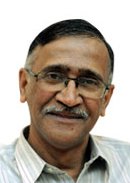President Ranil Wickremesinghe’s guests to Sri Lanka’s 75th I-Day on February 4, including our own minister V. Muraleedharan, had a pleasant surprise. They heard Namo Namo Matha and Namo Namo Thaaye being sung at the state ceremony, and were told that both are the national anthem. One is the Sinhala version and the other Tamil. Both mean the same, are sung in the same tune, and have been there since 1950, but the Tamil one has remained mostly unsung and unheard especially when Sinhala supremacists were ruling in Colombo. Maithripala Sirisena had allowed it in 2015, but Gotabaya Rajapaksa kept it in mute mode through the last three I-Days. Now Ranil has brought it back.
That was Ranil’s way of telling Muraleedharan and India, M.K. Stalin and his Indian Tamils, and of course the Tamils of Sri Lanka and the rest of the world that he is reaching out to the minorities. A few days later, Ranil travelled north to open the Jaffna Cultural Centre, the founding stone of which was laid by Narendra Modi in 2015, and was built with Indian funds. Another of Modi’s ministers, L. Murugan, witnessed the opening.
Ever since rioters invaded the presidential palace and booted out Gotabaya, India has been calibrating its aid to the country that has been bankrupted by Chinese loans and organic farming. We gave them $4 billion last year with no questions asked, and have been putting good words in the ears of the world’s moneylenders. The IMF, who usually lends after asking too many questions and laying down too many conditions, was reluctant saying the middle-income country cannot be given credit on poor country terms. What about Ukraine?—India asked, and the IMF, which had lent to middle-income Ukraine last March on poor country rates, is now working out modalities on lending to the Lankans.
The guys in the IMF are crazy. They also bar you from borrowing from anyone else at a rate higher than theirs. Now Japan, which wants to help, is waiting for the IMF to fix their rate.
Can’t blame the IMF. The Lankans still don’t know how to live with little. Ranil found in early February that he had earned only Lankan Rs 158.7 billion in January, but the month’s bills totalled Lankan Rs 367.8 billion. No more credit purchases, he has told his ministries. All the same, India “decided not to wait for others but to do what we believe is right,” as senior foreign minister S. Jaishankar had said on his Colombo visit a month earlier.
Ranil is doing what India believes is right. We had been nudging the regimes in Colombo to give more powers to the provincial councils, so that the Tamils in the north would get some sort of self-rule. The Sinhala majoritarian regimes, flush with a war victory, had been hemming and hawing, but Ranil seems to be in a mood to concede. A month ago, he called on the ailing Tamil leader R. Sampanthan, perhaps the only surviving Tamil leader who was active during the Rajiv Gandhi-J.R. Jayewardene accord of 1987, and recalled in his ‘throne speech’ that he and Sampanthan were elected to parliament in 1977, and both have a “dream, which is to provide a sustainable solution to the ethnic problem,” and that “we wish to succeed this time”.
Ranil is said to have assured Jaishankar and Muraleedharan that he would take a conscious decision on the 13th amendment which offers powers over land, the police, education, health, housing and local revenue to the provinces. He may, but how would the Sinhala majoritarians react to such a decision by an unelected president? We may get an idea when the ballots in the local body polls, set for March 5, are counted.
prasannan@theweek.in


